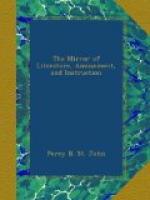In answering the spirit of this question, we shall not stop to inquire how far it is right as to the letter, or how many different forms of polity are to be found among other animals, such as the crows, the beavers, the monkeys; neither shall we examine how far instinct is superior to reason, nor why the example of man himself is to go for nothing. We will take for granted, that the bee is the wisest animal of all, and that it is a judicious thing to consider his manners and customs, with reference to their adoption by his inferiors, who keep him in hives. This naturally leads us to inquire, whether we could not frame all our systems of life after the same fashion. We are busy, like the bee; we are gregarious, like him; we make provision against a rainy day; we are fond of flowers and the country; we occasionally sting, like him; and we make a great noise about what we do. Now, if we resemble the bee in so many points, and his political instinct is so admirable, let us reflect what we ought to become in other respects, in order to attain to the full benefit of his example.
* * * * *
But we have not yet got half through the wonders, which are to modify human conduct by the example of this wise, industrious, and monarch-loving people. Marvellous changes must be effected, before we have any general pretension to resemble them, always excepting in the aristocratic particular. For instance, the aristocrats of the hive, however unmasculine in their ordinary mode of life, are the only males. The working-classes, like the sovereign, are all females! How are we to manage this? We must convert, by one sudden meta-morphosis, the whole body of our agricultural and manufacturing population into women! Mrs. Cobbett must displace her husband, and tell us all about Indian corn. There must be not a man in




